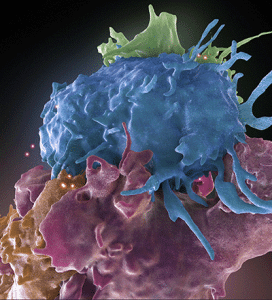
Director of the Southwest National Primate Research Center Professor Deepak Kaushal, Ph.D. says research he collaborated on is pinpointing a possible new avenue of protection for HIV/AIDS patients. The study, published this month in the journal Cell Reports helps scientists better understand how HIV promotes deadly cases of tuberculosis (TB).
One third of all HIV/AIDS patients die of complications from TB. The same mechanism of HIV/AIDS that leads to the loss of immune cells (CD4+ T cells) in other parts of the body also targets the lungs, opening the door for a latent infection with Mycobacterium tuberculosis (Mtb) bacteria to become active TB.
“If our findings are validated in future testing, this leads to the potential for new therapies (including perhaps host-directed) that would prevent the loss of these crucial T cells during HIV infection,” Dr. Kaushal said. “The idea is that fewer HIV patients would progress to TB.”
Until now, scientists weren’t too sure which parts of the lungs were targeted by the immunodeficiency. Dr. Kaushal conducted his work on rhesus monkeys infected with TB and SIV (simian immunodeficiency virus). Collaborators at Brigham and Women’s Hospital in Boston, Massachusetts, led by Dr. Bjorn Corleis, collected tissue either from a humanized mouse model or from humans. What both groups found was that not all T cells in the lungs are affected by HIV — only the ones embedded inside the lung tissue. T cells in the lung sacs (alveoli) where oxygen enters the blood stream were still functional.

This information is “important to know because we can target vaccines, therapeutics and drugs to these specific T cells in the lungs,” Dr. Kaushal explained.
Around the globe, the number of AIDS-related deaths is more than a million people annually. Since the beginning of the epidemic 35 years ago, more than 39 million people have died from the infectious disease.
Co-infections with HIV and TB are a persistent health problem. In otherwise healthy people with latent TB, only 5% will go on to develop active tuberculosis. In HIV/AIDS patients, the risk of developing active TB increases ten-fold to 50%.
This research was funded in part by grants from the National Institute of Allergy and Infectious Diseases (NIAID), the National Institute of General Medical Sciences (NIGMS), and the National Heart Lung and Blood Institute (NHLBI) of the National Institutes of Health (NIH). Other financial support was provided by the Burroughs Welcome Fund.
Grants include: U01HL121827, AI060354, T32GM007753, F301 IL 13466-02, AI111914, AI123780, AI111943, AI089323, HL106790, P51OD011104, and RR026006.
Collaborators on the paper include researchers from Ragon Institute, Massachusetts General Hospital, Harvard Medical School, Tulane University School of Medicine, Tulane National Primate Research Center, Southwest National Primate Research Center, and Washington University School of Medicine.